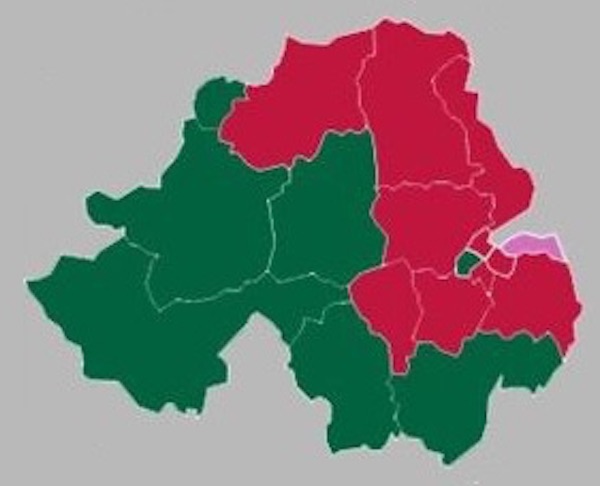
By Brian Feeney (for Irish News)
For the first time in fifty-one years, since Gerry Fitt was elected for West Belfast in 1966, there is no northern nationalist voice at Westminster.
The irony is that Fitt’s heirs in the SDLP made attendance at Westminster the only major point of difference between them and a reinvigorated Sinn Fein.
Nationalist voters comprehensively rejected the SDLP appeal and elected the largest ever number of Sinn Fein MPs on an abstentionist ticket with the largest ever Sinn Fein vote.
The fact that abstentionism was the only substantial difference between the two parties which the SDLP campaigned on is instructive in itself. Colum Eastwood copied every single item of the Sinn Fein policy, advocating a border poll for Irish unity, special status for the north in Brexit negotiations, no hard border etc., etc.
Not unnaturally voters opted for the real republicans especially since Sinn Fein with their powerful presence in the Oireachtas might have a chance of achieving some of these objectives.
The SDLP has been in steady decline for many years but Thursday night sounded its death knell. Literally the party’s over. There’s no way back from the overwhelming defeat in Foyle and South Down. The SDLP had already been outvoted in those constituencies in March but many thought tactical voting by unionists to keep Sinn Fein out would mask the SDLP’s weakness and save the party.
Instead, in the contest to outvote Sinn Fein unionists were advised to vote only unionist to record the maximum unionist turnout. The SDLP were left to face Sinn Fein alone and succumbed to their fate.
Three former failed leaders were wiped out and along with them the party’s last pretensions to electoral significance. It is a historic turning point in the north’s political history. The baton has been passed.
Like the defeated former party leaders Colum Eastwood has failed to identify or articulate a reason for the SDLP, exactly the problem his counterpart in the UUP Robin Swann is facing. Like the SDLP the UUP has been wiped out at Westminster as the electorate opted for the big battalion in each community. Like the SDLP and Sinn Fein Swann moved to take on board DUP policies, no special status, no to a border poll, and of course unionists voted for the party most likely to carry those policies through.
The election has revealed an increasingly polarised north with a de facto new border, a roughly crescent-shaped line. West of that line in Derry, Fermanagh and Tyrone curving through south Armagh into Down all MPs are republican. Unionists are squeezed into two and a half counties while Belfast is fifty-fifty in population with unionists to lose all representation in the city’s Westminster seats when the new boundaries apply.
The British first past the post system always starkly divides the map because voters have to plump for the party in their community most likely to win. That had the effect of consoling unionists that the assembly election was a short, sharp shock. It wasn’t. It’s an inexorable trend reflecting a declining unionist population. Perhaps the final demise of the SDLP may eventually induce a DUP leader to realise s/he has to make a genuine deal with Sinn Fein before it inevitably becomes the largest party in the north.
On the other hand, the parlous temporary unsustainable deal the DUP has just made with lame duck May could fuel the party’s delusions of grandeur. What Thursday’s election does mean is that there is not the remotest chance of resurrecting the Stormont executive with the British government and DUP openly conniving against Sinn Fein during negotiations as opposed to covertly which they’ve been doing up to now.
![[Irish Republican News]](https://republican-news.org/graphics/title_gifs/rn.gif)
![[Irish Republican News]](https://republican-news.org/graphics/title_gifs/harp.gif)

